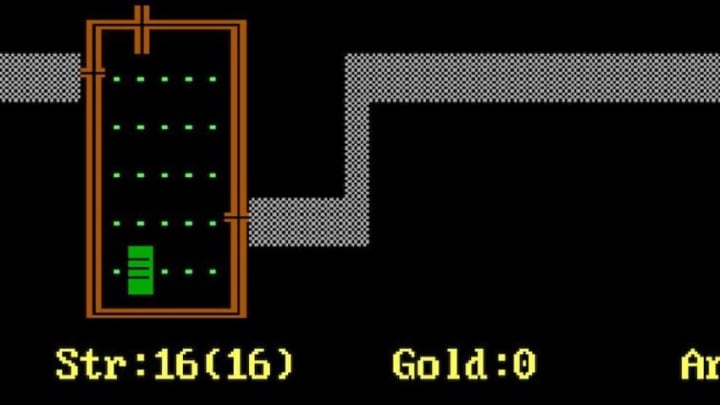In celebration of Rogue coming to Steam let’s discuss the history of the term Roguelike by examining this freely-distributed historical game.
I recently was involved in a conversation in which someone was describing a game as “Roguelike”. The word became a topic itself as people discussed why exactly a game would be called that. While they all agreed that a “Roguelike” is a genre in which stages are generated randomly, they weren’t agreeing on why. One person felt like it was called that because it would be the kind of area you’d find a rogue or a thief exploring. Another claimed that it was the kind of map trickery a rogue would pull on someone to keep them confused.
I’m here to settle this and let you know you’re all wrong.
See, there’s a meme in the world of video games about people comparing things to Dark Souls. I, personally, have a note in my office with a “no” symbol over the phrase Dark Souls as a reminder to myself to avoid that comparison as much as possible. But before that, before ever the term “Metroidvania”, there was “Roguelike”.
Back in 1980 (the same year both me and Pac-Man were born in), there was a video game called “Rogue”. A game that, surprisingly, is returning to computers via Steam very soon.
By today’s standards it can be so ugly it’s practically like looking at a magic eye, but when you get used to what you’re seeing and playing it’s actually a remarkably in-depth game for the time featuring over 20 unique enemy types, a leveling system and, most famously, procedurally generated dungeons.

The game also featured permadeath so as you played through the game if you found yourself getting wiped out because it was a roleplaying game in the truest sense, you died. No save points, nothing. Rogue did not like you even if you liked it. You died, welcome back to the start, son.

More from App and Gaming News
- Cyberpunk 2077 Update 2.1: Last major update released
- GTA 6: Who is Lucia and what is her role?
- Sonic Dream Team review: A welcome surprise to Apple Arcade
- Is GTA 6 coming to PC at launch in 2025?
- GTA 6 trailer arrives early, confirming 2025 release: Watch it here!
Created by Michael Toy and Glenn Wichman, this was a game designed for free for the Unix System (ask Lex Murphy, she knows this). Later on programmer Ken Arnold would hop on with them and really helped flesh it out a bit more and over time the game spread around like a legend. As it was freely-distributed and featured open-source coding the game was put on all sorts of systems and, because so many people played it, became the inspiration for many other dungeon crawling games, quickly dubbed “Roguelike” in the game’s honor.
So, soon it will be coming to Steam where it is estimated will cost before $2 and $5 OR you can just play it online for free like I do because that’s what the original creators would have wanted as they never intended the game to be sold for cash. Oh, just don’t forget that “>” lets you go down greenstair cases like everyone does the first time they play this for the first time in a while. You’re welcome.
